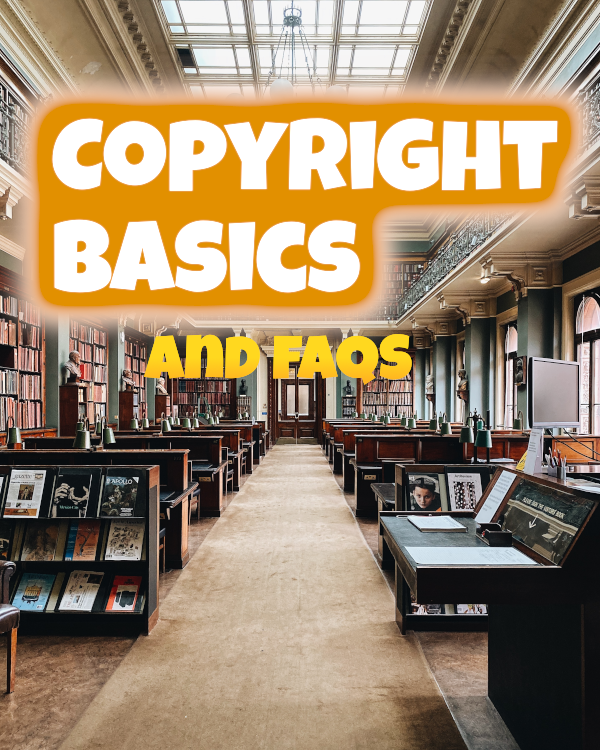
What is copyright?
Copyright is exactly what it sounds like: the right to copy something. You might not know it, but you own thousands of copyrights. That drawing you made in 3rd grade with the horse and the rainbow? Copyrighted. The long email you wrote this morning? Yeah, you own the copyright in that.
How do I get copyrights?
You get a copyright any time you create something that is:
- Original; and
- The result of creative effort; and
- Recorded (typed, handwritten, audio recording, video, etc.)
You get the rights automatically. You do not need to publish it and you do not need to put a copyright symbol on it.
What if the thing I made is awful?
Doesn’t matter, as long as it meets the criteria above, you hold the copyright to it. Yes, even that terrible novel you never finished in 11th grade. Now, it’s worth noting that there are degrees of originality. For example, if you take a piece of paper and draw a heart icon on it, that’s probably not copyrightable because even though there may not be any heart icon in the world that is exactly like it, it’s so simple and similar to other works that courts likely wouldn’t consider it original enough. This is known as the Threshold of Originality.
What is copyrightable?
Articles, books, music, art, video, computer source (including script) and binary code – anything that is recorded (including in writing) that meets the 3 criteria above (original, done with creative effort, and recorded) and doesn’t fall into the exceptions below.
What is not copyrightable?
Copyright does not protect facts, ideas (including, for example, lists of ingredients in recipes), names, short phrases, and anything that doesn’t fall within this list but nonetheless fails to meet the 3 criteria above (original, done with creative effort, and recorded).
What rights are included within “copyright”?
- reproduction right: the right to make copies,
- distribution right: the right to sell or distribute copies
- right to create adaptations (or “derivative works”): the right to prepare new works based on the original
- performance and display rights — the right to perform or show the work in public such as a play, musical, concert, movie showing, or public reading
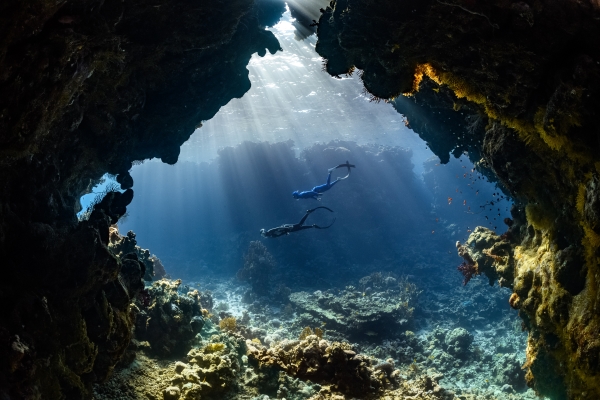
What are copyright symbols (©) for?
You don’t need to use copyright symbols in order to automatically own your copyrights. The purpose of copyright symbols is to put other people on notice that you own the copyright in the content the symbol appears on. This can be useful if you ever need to take action against someone who copied or stole your stuff without permission, such as sending them a “demand letter”, asking a website or platform such as YouTube to remove the content from the internet, or suing them.
If someone copied my stuff and put it on YouTube as their own, did they violate my copyright?
They sure did! Read this article about how to get the stolen content removed from the internet or give us a call for a free consultation to discuss your unique situation.
How long does a copyright last?
In the U.S. copyright lasts for the life of the author plus 70 years (i.e., for 70 years after you die). After that, the work enters the public domain (meaning anyone can copy and use it for any purpose).
What if the thing I made was made during my job, do I still own the copyright?
Probably not. If you work in a corporate environment, most employers make you sign some paperwork your first day on the job. Within that paperwork is a document that automatically transfers ownership to anything you make during the course of your job to your employer. But this situation is very fact- and circumstance-dependent, please consider reaching out to us to discuss your unique situation.
If I use someone else’s stuff, will I be ok if I just write a little blurb that says that they are the author?
No, you need permission from the author (the copyright holder) in order to copy or use their content. There are exceptions to this general rule, for example, what’s called Fair Use, however, an attorney who practices copyright law is best-positioned to advise on unique circumstances.
People get confused on this subject because sometimes this is actually okay because the original holder of the copyright said it’s okay. For example, photos are sometimes licensed by the photographer under a Creative Commons license. Many Creative Commons licenses give members of the public the ability to reuse a photo for any purpose as long as there is an attribution (some text giving credit to the photographer by name) in close proximity to the photo.
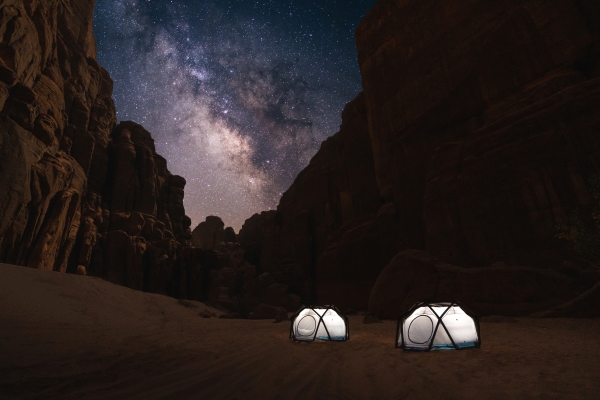
Is source code or script copyrighted?
Yes, as long as it meets the criteria set forth above. However, some source code and script is open-source software. This means the source code or script can be used under certain conditions and for certain purposes. We can analyze the specific source code or script in question and advise on your ability to use it. If the source code or script is licensed under a copyleft license, you need to be especially careful about using it. You can read more about that scenario in this article about copyleft licenses.
Can I use someone else’s music in my video?
Generally, no. The only time you can use someone else’s music in your video is if they licensed that music under a license that permits people to use their music for other purposes, such as a Creative Commons license. You can also use someone else’s music in your music video with their permission. If they are a famous artist, they are not going to grant you permission unless you roll up with all of that money. If they are a little-known artist, it is possible that they will grant you permission if you provide them something in return.
For example, if you provide attribution to the artist or if you drop a hyperlink to their website, especially if you are a really big or famous content creator, the copyright holder might be amenable to the use if you have a conversation with them about it. Let’s say you’re a YouTuber who gets half a million views on each video. It is highly likely that if you reach out to a little-known artist that they would allow you to use their music in your video, as long as you did certain things for them in return, as mentioned above.
Having said all that, if you are not dealing with music that is licensed under a permissive Creative Commons license or that is in the public domain and you do not have permission from the original artist, you cannot use their music, even if it is a very small amount of the music. And on some of the bigger platforms, video platforms – obviously YouTube is the biggest – they have software that they use to analyze newly-uploaded videos and to automatically search for copyrighted content, including video and audio, and oftentimes the video that you upload that contains someone else’s music, especially if it’s famous music, will be blocked from the outset.
Can I use someone else’s photo or artwork in my newsletter or other marketing content?
You see questions like this all the time on places like Reddit, and the answer is: “it depends.” As soon as people start learning about the basics of copyright law, one of the questions that comes up is like, well, how can an animated GIF exist, right? Like imagine the animated GIF of, like, a popular cartoon with some text that someone put over it. Is that subject to copyright? Well, yes, it’s absolutely subject to copyright, but this is where the law meets the real world, right?
So like, let’s say that you know some kid in his basement on his parents’ computer creates an animated GIF and posts it on social media. OK, and let’s say it’s copyrighted content. The reality is that going after everybody who does something like this is extremely expensive and not practical for the person who created the cartoon in the first place. In addition to that, the existence of the animated GIF, especially if it goes viral, is free marketing for the people who own the copyright to the underlying cartoon that’s being used in the animated GIF to begin with. So here is where theory meets practice.
Now let’s take another example in a corporation. A lot of times you’ll have internal wikis, maybe you know folks who use SharePoint or they’ll use Confluence and you might see images from popular movies or other copyrighted things used in that context. Is that copyright infringement? Again, the answer is yes, it is. But they’re not publishing. You know those platforms aren’t published outside of the business or outside of the collaboration platform. So how is the copyright holder ever even going find out about something like that?
In something like a newsletter, you’ll sometimes see copyrighted images. Again, it’s kind of the same thing here. Somebody, for example, writing a small investing newsletter that goes to, you know, 250 subscribers? This is really small-potatoes kind of stuff. And again, the copyright holder, you know, they just might not have the attention span or the resources to go after every single incident of copyright infringement. So, is there a lot of copyright infringement in the world that goes unnoticed or is ignored? Absolutely.

How come memes get to use other people’s copyrighted stuff?
With memes such as animated GIFs or short videos, they are protected by copyright. There’s no exception for them. Again, this is where the real world meets theory, right? So there’s theory and there’s practice. In the case of, you know, an animated GIF maybe it’s only a few seconds long. And maybe it’s a video from a movie and there’s some text overlaid on top of it. Especially if it goes viral, it’s pretty much impossible for the copyright holder to scrub it from the Internet. I mean, they would have to reach out to like hundreds and thousands of different websites and people to try to get it taken down entirely. So it’s just really not practical. And a lot of times the people that are passing the meme around are individuals and individuals oftentimes do not have lots and lots of money and so suing them is not really a good use of time. Also, it’s important to keep in mind that an animated GIF or a meme is actually free publicity for the underlying copyright holder. And so that can inform their actions or their lack of action as well.
What if the stuff I’m making is free? Does that change anything?
This is a common misconception. The fact that you are using someone else’s copyrighted content in a way that doesn’t earn you any money is not a get-out-of-jail-free card when it comes to copyright infringement.
Can I use screenshots from video games in my content? r/gamedev said it wasn’t ok?
Generally, no, you can’t. The video game itself and the images produced by the video game are copyrighted content and they are subject to a license (a contract) that governs the video game itself. A lot of people don’t realize this, but when you install or use a video game, you’re agreeing to terms of service or an end user license agreement (contracts) that could be 5,000 words long, and it says a lot of things, and it might have language in there about what you can and cannot do with still images from the game. Even if that were not the case, copyright law protects the images that their software produces.
But how come I see photos on websites with an attribution to the photographer or Getty Images? Isn’t that a copyright violation?
Yeah, people sometimes get confused about this. Why? They’ll see a photo on the Internet and then underneath the photo it’ll read “source: Billy Smith” or “source: Getty Images.” This happens because sometimes these photo marketplaces will sell you the right to reuse an image with strings attached, meaning they will require you contractually to provide attribution. So you must drop, you know, a little text that says something like “source Getty Images” near the photo.
Similarly, websites like unsplash.com or pexels.com, even though they have free photos on there, sometimes they will, you know, have a policy that encourages people that use these free photos to provide attribution to the original photographer. So you don’t have to do it, but it’s a nice thing to do, right? They’re giving you a photo to use for free. The thinking is that the least thing you can do is drop attribution to the artist. And the third use case here is the blog or the website that you’re on – they’re literally just ignorant of copyright law, and they actually believe that they can take someone else’s photo or someone else’s artwork and they can publish it and they’ll be safe from a lawsuit if they simply drop a line that says, oh, “Billy Smith is the original author of this work.”
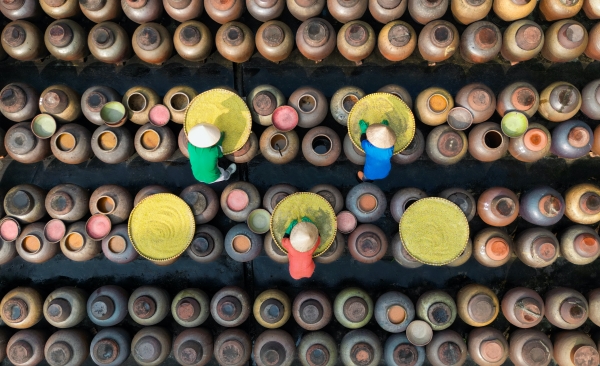
What if I take someone else’s content and then modify it a bit, is that ok? I made an STL file from someone else’s STL file that I changed. r/3Dprinting sent me
No, this is not okay. Copyright law grants the holder of the copyright the exclusive ability to create what are called “derivative works” from their original work. So you would need permission from the original author in order to modify the work. That is the theoretical, correct answer. In the real world, things are messy, right? If you take someone’s work and you modify it beyond recognition, meaning even the original artist or photographer who looked at it would be like, “oh, you know, I’ve never seen that before. I don’t know what that is.” and it just happens to be something that was derived from their stuff. Well, guess what? It’s now very difficult for the author to identify the infringement.
What about the First Amendment to the Constitution of the United States? Free speech means I can say stuff that’s already been said, right? Shouldn’t the First Amendment beat copyright?
Good question! The Constitution actually explicitly authorizes Congress to make copyright law under what’s referred to as the Intellectual Property Clause (Article I, Section 8, Clause 8). It reads, in part, “[The Congress shall have Power . . . ] To promote the Progress of Science and useful Arts, by securing for limited Times to Authors and Inventors the exclusive Right to their respective Writings and Discoveries.”
How come some artists can just make comic books that seem like rip-offs of already-existing books? How does something like webtoons.com even exist? r/webtoons sent me
Yeah, a lot of people don’t realize this, but when a book becomes very popular or a book series becomes very popular there are what are called “licensed adaptations.” So the original author wants to, obviously, profit from their work, as they should, and their work may not be accessible to everybody, right? So like, let’s say it’s, you know, a complicated novel that only adults can read. There might be a demand from children to, you know, read and understand the novel, but they just can’t, right? So you might end up with the original author hiring somebody to create a comic book out of it, using the same characters and the same concepts, and it’s still really compelling, but now it’s in a form and in a medium that a totally different audience finds appealing and can understand and relate to.
So, the answer here is basically this stuff exists because the original copyright holder allows it to exist and is actually being paid money for the adaptation as well. So they’re splitting the revenue that comes from, you know, in this example, the comic book version of their novel with the person who created the comic book.
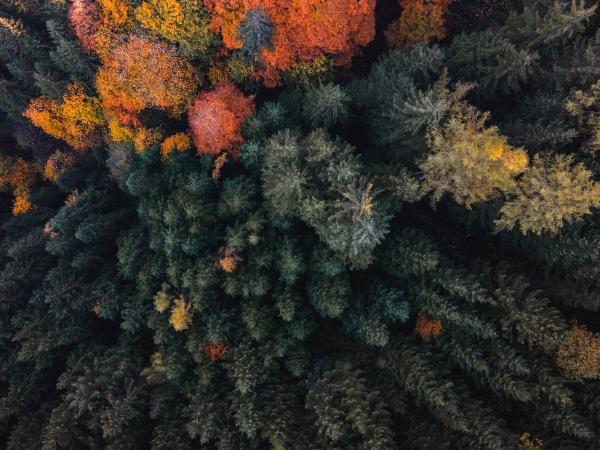
Who owns the copyright of a comment you post on Facebook?
There’s really two pieces to this answer, so first of all, it’s important to understand that a comment itself might not be copyrightable, meaning it might not be sufficiently original or sufficiently long or unique to have copyright protection.
Now, assuming it is, the second piece of this answer is that when you publish something on a platform such as Facebook or Reddit, or you know any platform or forum on the Internet, that platform or forum is going to have a contract that governs how you interact with their website. You may not realize this, but if you look in, you know, the footer of the website, oftentimes you’ll see something that says “Terms of Use” or “Terms of Service” or “Web Terms” or something like that. And if you click on that it will say what happens to the copyright in your content. And it may say something like “Reddit can profit from reproducing your comment. However, you’re allowed to delete your comment at any time.” So there is copyright law, but then there is also the contract of the platform where you’re posting the comment and those things need to be considered in conjunction with one another, so it’s really a facts-and-circumstances analysis.
Is there a minimum length for text to be copyrighted? Is a single sentence copyrighted?
Yes and no. The general rule is that copyright law does not protect “short phrases.” Having said that, there are unique circumstances where very little text can be copyrightable and the length of the original work versus how much of that text is being taken and reused informs whether or not there’s been copyright infringement. For example, in 2001 a court decided that Audi had infringed the copyright of an artist who published this sentence in conjunction with a work of art: “Some people don’t know that there are angels whose only job is to make sure you don’t get too comfortable fall asleep miss your life.” Audi later published a commercial for one of its cars that contained this as the voiceover: “”I think I just had a wake-up call, and it was disguised as a car, and it was screaming at me not to get too comfortable and fall asleep and miss my life.” Boom, copyright infringement, million dollars in damages.